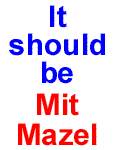A Mitzvah of Intoxication?
Q. What does it mean when the sages 'pass a law' saying "One is obligated'? Who is obligating us? The authority of the Rabbis? The authority of Torah that tells us to obey the rabbis? Or possibly reality itself?
In the example of Purim it is Purim itself that 'obligates'. It is the quality of the day. If you felt the energy that Purim produces you would feel 'obligated', compelled, moved to get yourself beyond 'cursed' and 'blessed'; you would come to a place where Haman is despised and Mordechai is adored for their essences, ABSOLUTELY, even if they were both cursed or both blessed.
True is true. Nothing matters beyond the truth. For example: there are no other gods besides G-d. So I don't worship idols. Is G-d more powerful than the idol? Irrelevant. Idols are not true. Is idol worship cursed and damning? Irrelevant! If idols were beautiful, meaningful and inspiring, if they brought rain or made you fertile, if it could heal sickness and bring bliss, I still do not worship them because they are not true. Like the false prophet who impresses with unusual talents and psychic ability, he is still a false prophet if he contradicts the truth of Torah.
Are we too confused to know simple truths? Are we too sophisticated to appreciate that right is right and wrong is wrong?
Sin is sin. Must it also be too expensive before I reject it?
Sin is sin. Must it also be unnatural? Perverted? Unhealthy? Distasteful? Pig is forbidden but what if it is the healthiest meat? What if it is cheaper, cleaner, more tasty than kosher food?
Would that change the truth?
A Jew can not marry a non-Jew; It is not a marriage. But if he is a doctor? Nicer than any Jew you've met and more spiritual? What if he is “blessed” and Jews are "cursed"? Then what?!
And this is the message of Purim and the Mitzvah to not know the difference between "Cursed is Haman" and "Blessed is Mordechai": Regardless of all other considerations, Haman remains Haman and Mordechai is still the Yehudi.
Send Page To a Friend








 Join Rabbi Friedman online live from
Join Rabbi Friedman online live from